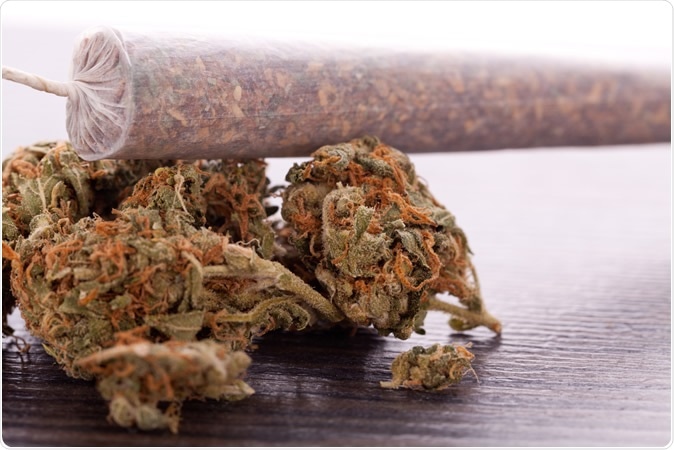Pregnant women should refrain from smoking cannabis to prevent their infants from being born early, a new study warns.
A team of researchers in Ontario, Canada have found that women who use cannabis or marijuana during pregnancy face a doubled risk of going into labor prematurely.
The study, which was published in the Journal of the American Medical Association (JAMA), shows the heightened risk of smoking cannabis among pregnant women, as they are twice as likely to experience premature birth and increased risk of serious complications.
In fact, about 12 percent of those who used the medicine gave birth before 37 weeks. That’s way higher than the 6.1 percent in women who did not use or smoke cannabis.

Image Credit: JuNiArt / Shutterstock
Greater risk for pregnancy complications
Also, pregnant women who used the drug were at a greater risk of experiencing serious pregnancy complications such as placental abruption, where the placenta separates, from the uterine wall. It may lead to deprivation of the baby’s oxygen and nutrient supply. The mother may also experience heavy bleeding, which can be potentially fatal.
“Cannabinoids can readily cross the placenta and enter the fetal bloodstream. Animal studies suggest that THC exposure during pregnancy can disrupt the complex fetal endogenous cannabinoid signaling system and may be associated with adverse pregnancy outcomes,” the authors said in the study.
In the study conducted in Ontario, the researchers collected data from 661,617 pregnant women and out of these, 9,427 reported cannabis use.
The results show that aside from the pregnant women had a higher chance of giving birth early, their babies had lower weight and had to be taken to the neonatal intensive care unit (NICU). Preterm birth is defined as giving birth less than 37 weeks out of a full term of 40 weeks.
“These risks are concerning because, for example, being born small is related to other complications in newborns and higher rates of certain diseases later in life,” Daniel Corsi, an epidemiologist, and co-author of the study, said in a statement.
“We recommend against using cannabis in pregnancy. The best advice for women would be to speak to their healthcare provider, physician or midwife to discuss alternatives to cannabis for treating morning sickness,” he added, noting that he suspects cannabis use was mainly due to pregnancy-related nausea or “morning sickness”. Many believe that it can reduce nausea during pregnancy.
Morning sickness is extremely hard to manage and deal with, but healthcare professionals encourage pregnant women to avoid using cannabis to relieve the symptoms until there are more studies and information available.
Increasing cannabis use rates among pregnant women
In another study published in the same journal, alongside the study conducted in Canada, the researchers from Maryland report that the number of pregnant women smoking cannabis or taking the drug during pregnancy is increasing.
Based on the overall respondents of 467,100 between 2002 and 2017, the incidence of cannabis use has dramatically increased. In fact, the number of women in the United States using marijuana or cannabis during pregnant in 2017 was more than doubled from the number recorded in 2002.
They also found the prevalence of cannabis use during pregnancy was higher during the first trimester than the second and third trimester. Many women may have used cannabis during the first trimester to relieve morning sickness symptoms.
Cannabis has been legalized in many parts of the United States and Canada. Legalization has contributed to the increase of its use, even among pregnant women.
To land to their findings, the researchers gathered data from the National Survey on Drug Use and Health (NSDUH) involving women aged 12 to 44 years old between 2002 and 2017. The data from self-reported questionnaires shows the comparison between 652,190 pregnant women who never used cannabis and 9,427 pregnant women who admitted being using cannabis.
Dr. Nora Volkow, director of the National Institute on Drug Abuse said that legalization of cannabis may partly explain the increasing number of usages, since many assume it’s safe, including pregnant women.
“It’s very appealing to think that a drug that makes us feel great could come with no ill effects,” she added.
Journal references:
- Corsi, D., Walsh, L., and Weis, D. (2019). Association Between Self-reported Prenatal Cannabis Use and Maternal, Perinatal, and Neonatal Outcomes. Journal of the American Medical Association (JAMA). https://jamanetwork.com/journals/jama/fullarticle/2736583
- Volkow, N., Han, B., and Compton, W. (2019). Self-reported Medical and Nonmedical Cannabis Use Among Pregnant Women in the United States. Journal of the American Medical Association (JAMA). https://jamanetwork.com/journals/jama/fullarticle/2736582